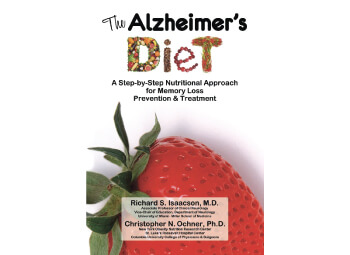One in eight people has Alzheimer’s disease. According to the Alzheimer’s Association, between 2000 and 2025, some states and regions across the country are expected to experience double-digit percentage increases in the overall numbers of people with Alzheimer’s due to increases in the proportion of the population over age 65.
“The Alzheimer’s Diet,” a book published last fall by Richard Isaacson, M.D. and Christopher Ochner, Ph.D. cites scientific evidence that may cause more doctors to recommend dietary changes to patients suffering from poor memory function. They also shared these memory-boosting dietary recommendations:
1. Fast 12 hours at night. Here’s a brain health secret: the 12-hour nightly fast. If you routinely wake up at 6 a.m., try to eat your last meal by 6 p.m. the night before. There is scientific evidence that substances called ketone bodies, which are produced when there are no carbohydrates to burn for fuel, may have a protective effect on brain cells—no late-night snacking between dinner and breakfast.
2. Proportion your fat-carb-protein intake. Every day, make sure you aim for 25 percent of your total calories from brain-healthy good fat: olive oil, avocados, certain nuts, natural peanut butter, certain seeds, and certain fish. Limit your intake of bad fats: most fast foods, anything hydrogenated, dried coconut, butter, animal fats, milk chocolate and white chocolate and cheese. Consume 30-45 percent of your daily calories from complex carbohydrates: fruits, vegetables (YES!) and whole foods low on the glycemic index. Leave high glycemic carbs: sugars, high-fructose corn syrup, processed cereals and grains, anything baked, whole milk and cream, ice cream and sorbet, crackers, salty snacks such as chips and pretzels, and anything made with white flour. Obtain the remaining 25-35 percent of your calories from high-quality lean protein.
3. Boost your brain nutrients. Know that Omega-3 fatty acids (DHA and EPA) are essential for memory function and brain health. Most of us don’t get enough from dietary sources like fish, so consider high-quality, pure fish oil supplements that contain a minimum of 250 mg of DHA in each capsule, and aim for 1,000-1,500 mg of DHA daily if approved by the treating physician. Antioxidant-rich foods are also great for mental function. Some of the best are berries, kale, 100 percent pure unsweetened cocoa powder, mushrooms, onions, beans, seeds, sardines, herring, trout, and Alaskan wild salmon. Finally, ensure adequate intake of folic acid, B6, B12, and vitamin D in particular. If not from food, supplement as needed in pill or liquid form.
4. Eat whole foods, Mediterranean style. A brain-healthy Mediterranean-style diet includes fruits and vegetables, lean protein (fish, chicken, and turkey); low-fat yogurt and cheeses; and grains, nuts, and seeds. Stay away from red meat and processed foods. Eat whole foods that have only one ingredient—for example, strawberries, broccoli, or barley. Find packaged, canned, and frozen items with the fewest ingredients–especially ingredients that you readily recognize and understand.
5. Enjoy coffee and pure cocoa. Caffeinated coffee, 1-3 cups early in the day, may help your brain, according to European studies assessing memory. An August 2012 study showed that patients with mild cognitive impairment who had regular intake of the strong antioxidants found in pure dark cocoa powder had improvement in memory function.
Now eating isn’t just about your stomach anymore.
